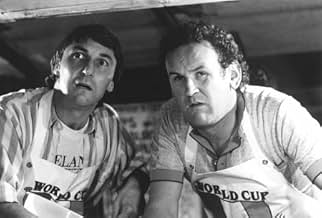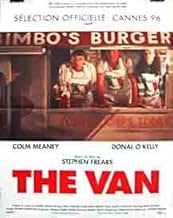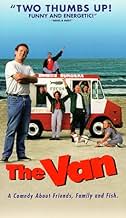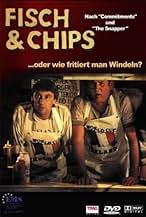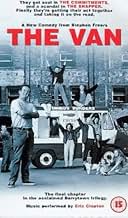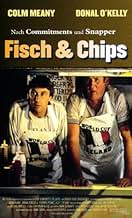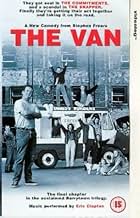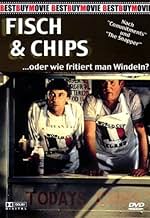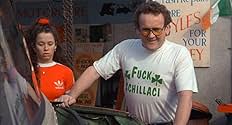Set in the fictional Dublin suburb of Barrytown, Bimbo is a baker who loses his job after being made redundant. Bimbo then acquires the help of his best friend, Larry, to set up a successful... Read allSet in the fictional Dublin suburb of Barrytown, Bimbo is a baker who loses his job after being made redundant. Bimbo then acquires the help of his best friend, Larry, to set up a successful burger van.Set in the fictional Dublin suburb of Barrytown, Bimbo is a baker who loses his job after being made redundant. Bimbo then acquires the help of his best friend, Larry, to set up a successful burger van.
- Awards
- 1 nomination total
Featured reviews
"The Van" is one of very few novels that have made me laugh out loud, on numerous occasions, whilst reading it. Thus, I feared the movie couldn't possibly live up to the book and I was right.
The characters appear nowhere near as appealing as they do in the book -even the lead characters name has changed from Jimmy to Larry. In fact the Rabbite family has been drastically culled. The dialect can be difficult to catch at times (my wife mistook "World Peace" for "Wolf's p**s" during one pun). The "Living Dead" appear from nowhere and........no, I'm not doing any more comparisons.
If you want a good laugh read the book.
The characters appear nowhere near as appealing as they do in the book -even the lead characters name has changed from Jimmy to Larry. In fact the Rabbite family has been drastically culled. The dialect can be difficult to catch at times (my wife mistook "World Peace" for "Wolf's p**s" during one pun). The "Living Dead" appear from nowhere and........no, I'm not doing any more comparisons.
If you want a good laugh read the book.
The Van, a 1996 Stephen Frears film who would go on to much better things, takes on the ideas of desperate, inglorious situations and scenarios, such as unemployment, and wraps them up into packages ready to be delivered as comedy. There is nothing at all funny about the situation the two leads in the film find themselves in, but there is something distinctly charming about the way in which they deal with it.
While not essentially British, a given thanks to the over emphasis on how wonderful it was for the characters to witness the Irish football team pull back a goal and hold on for a draw against the English, while most of the other matches go unnoticed. However, it is directed by an Englishman and the film does posses rather a few items that were written about in regards to some growing fears and concerns simmering at the time within the British film industry, with particular attention to the comedy genre. If we recall Claire Monk's writings in the late 1990s, we might think of films such as Brassed Off and The Full Monty as being films depicting jobless British males turning to alternate methods of money making to get by; effectively rendering the crisis of post-industrialism (closure of mines and steel mills) as a crisis of masculinity. She also writes about these films transitioning problematic situations into comic solutions. These ideas and scenarios might be applicable to The Van, a film that spins job-loss and perceived men in crisis into a series of jokes and gags; a film that, like said examples, see the leads turn to either an entertainment or cultural supply and demand industry, in which they eventually come to relish.
One of the two leads in The Van is Bimbo (O'Kelly), a man who has lost his job and gets by off of his redundancy money. The other is Larry (Meaney), and between them, they aim to get a portable fast food outlet up and running. Whilst it's not about becoming strippers or brass-band musicians, it is essentially about two men turning to cooking and meal preparation by way of getting by. Its set up; a male panic, followed by a lot of sitting around complete with head scratching before hitting upon an idea to move into what is a form of the cooking industry, sees the two leads adopt a culinary position; something that Monk may have been alluding two when she describes early 1990s 'new men' as having to now share the once sole motherly burdens; this of course includes cooking and meal preparation. Yes, it's a fast-food van but the progressive realisation that the only way to deal with the 'panic' is to do something thought of initially as somewhat unthinkable and hapless, is certainly explored; the last resort, 'you'll never see me doing that/in one of those things' notion is tested before becoming the source of humour. One character refers to burger vans as portable 'food poisoning', before succumbing to working within one later on.
The van of the title acts as both a physical representation for the nucleus of the two leads' study, but also as a cinematic space in which it is able to play out. When we first encounter the van, it is located in a desolate and sorry place; a place that sees its characters struggle to push their way through all the other hazards around it just to catch a glimpse. The van is broken, worn-out and decrepit – it's seen better days. But the van is transformed; it is updated and goes through a process of modernity before, in time, is back up and running and solving the characters' problems. The process the van goes through is similar to that of the main characters, as these beaten and well-worn individuals whom have seen better days suddenly becoming success stories again; garnering a final day in the sun.
But if The Van is supposed to be a comedy, blending in the harsh and realistic working class life of terrace house living; cramped conditions; redundancy and frustrations with one's overall life with what is, I think, supposed to be a 'feel-good' approach; then it's not a terribly funny one. One of the film's stranger scenes applies a very visceral sense of humour whilst exploiting what little knowledge these perceived men in crisis actually know about the kitchen 'space'; that being when Larry scolds himself whilst trying to deep fry fish and fry eggs, with the fat popping and jumping up onto his forehead and hands thus scolding him. It's an odd scene; a scene in which the male is ill-suited to his culinary surroundings, we are invited to laugh before realising that if he doesn't get back in there, give it another crack and get it right then his life will get doubly worse in an instant.
But The Van has charm, although its charm isn't really enough. It doesn't invite us to laugh at two people on the skids as much as it does invite us to marvel and be entertained at the manner in which they refuse to buckle and hit rock-bottom. The film's humour is too wavy, either settling for scenes in which its characters are under the influence of alcohol or instances in which the burger van is mobbed by a sea of customers all shouting and ordering at once which, and granted, I haven't ordered many meals from many burger vans, but I'm smart enough to know, just doesn't happen. However, you might say its inconsistencies and its broad, uneven feel help in adding to its overall charm of two people just trying to get by; and I wouldn't really begrudge anyone for being fond of it for that.
While not essentially British, a given thanks to the over emphasis on how wonderful it was for the characters to witness the Irish football team pull back a goal and hold on for a draw against the English, while most of the other matches go unnoticed. However, it is directed by an Englishman and the film does posses rather a few items that were written about in regards to some growing fears and concerns simmering at the time within the British film industry, with particular attention to the comedy genre. If we recall Claire Monk's writings in the late 1990s, we might think of films such as Brassed Off and The Full Monty as being films depicting jobless British males turning to alternate methods of money making to get by; effectively rendering the crisis of post-industrialism (closure of mines and steel mills) as a crisis of masculinity. She also writes about these films transitioning problematic situations into comic solutions. These ideas and scenarios might be applicable to The Van, a film that spins job-loss and perceived men in crisis into a series of jokes and gags; a film that, like said examples, see the leads turn to either an entertainment or cultural supply and demand industry, in which they eventually come to relish.
One of the two leads in The Van is Bimbo (O'Kelly), a man who has lost his job and gets by off of his redundancy money. The other is Larry (Meaney), and between them, they aim to get a portable fast food outlet up and running. Whilst it's not about becoming strippers or brass-band musicians, it is essentially about two men turning to cooking and meal preparation by way of getting by. Its set up; a male panic, followed by a lot of sitting around complete with head scratching before hitting upon an idea to move into what is a form of the cooking industry, sees the two leads adopt a culinary position; something that Monk may have been alluding two when she describes early 1990s 'new men' as having to now share the once sole motherly burdens; this of course includes cooking and meal preparation. Yes, it's a fast-food van but the progressive realisation that the only way to deal with the 'panic' is to do something thought of initially as somewhat unthinkable and hapless, is certainly explored; the last resort, 'you'll never see me doing that/in one of those things' notion is tested before becoming the source of humour. One character refers to burger vans as portable 'food poisoning', before succumbing to working within one later on.
The van of the title acts as both a physical representation for the nucleus of the two leads' study, but also as a cinematic space in which it is able to play out. When we first encounter the van, it is located in a desolate and sorry place; a place that sees its characters struggle to push their way through all the other hazards around it just to catch a glimpse. The van is broken, worn-out and decrepit – it's seen better days. But the van is transformed; it is updated and goes through a process of modernity before, in time, is back up and running and solving the characters' problems. The process the van goes through is similar to that of the main characters, as these beaten and well-worn individuals whom have seen better days suddenly becoming success stories again; garnering a final day in the sun.
But if The Van is supposed to be a comedy, blending in the harsh and realistic working class life of terrace house living; cramped conditions; redundancy and frustrations with one's overall life with what is, I think, supposed to be a 'feel-good' approach; then it's not a terribly funny one. One of the film's stranger scenes applies a very visceral sense of humour whilst exploiting what little knowledge these perceived men in crisis actually know about the kitchen 'space'; that being when Larry scolds himself whilst trying to deep fry fish and fry eggs, with the fat popping and jumping up onto his forehead and hands thus scolding him. It's an odd scene; a scene in which the male is ill-suited to his culinary surroundings, we are invited to laugh before realising that if he doesn't get back in there, give it another crack and get it right then his life will get doubly worse in an instant.
But The Van has charm, although its charm isn't really enough. It doesn't invite us to laugh at two people on the skids as much as it does invite us to marvel and be entertained at the manner in which they refuse to buckle and hit rock-bottom. The film's humour is too wavy, either settling for scenes in which its characters are under the influence of alcohol or instances in which the burger van is mobbed by a sea of customers all shouting and ordering at once which, and granted, I haven't ordered many meals from many burger vans, but I'm smart enough to know, just doesn't happen. However, you might say its inconsistencies and its broad, uneven feel help in adding to its overall charm of two people just trying to get by; and I wouldn't really begrudge anyone for being fond of it for that.
Two Irish men with wives and children find themselves on the dole. One of them buys a large van and turns it into a "chippy." Naturally, he asks his best friend to work there with him. These two approaching-middle-age men have to work incredibly hard, but do have some success at the venture. It doesn't take long, however, for the friendship to get in the way. The one who fronted the money for the van is the boss, and the other one who didn't put up any money to get the small business going is the employee, who eventually becomes bitter at drawing a weekly paycheck from his best friend, who joins a union and begins antagonizing his best friend about labor laws, and whose insecurity in life shows clearly -- after all, the job isn't glamorous by any means, and of course, the reality of it is far removed from his dreams, we should imagine. The tension grows between the two. Set in Ireland during a World Cup Finals competition in soccer, this film gives us an intimate, grungy peek at the everyday realities of the poor in Ireland. It's "grand" to venture forth and set up one's own business and get off the dole, but of course, things are unlikely to run smoothly.
The Van is directed by Stephen Frears and written by Roddy Doyle. It stars Colm Meaney, Donal O'Kelly, Ger Ryan and Caroline Rothwell. Music is by Eric Clapton and Richard Hartley and cinematography by Oliver Stapleton. It is the third film in Roddy Doyle's Barrytown Trilogy, it was preceded by The Comittments and The Snapper. Plot sees Meaney and O'Kelly as best pals who after struggling with unemployment decide to do up an old fast food van and make a living out of selling burgers and chips. Initially it's a fulsome venture as the country is taken over mu football fervour during the 1990 World Cup finals in Italy, but it's not long before cracks begin to appear in the two friends' relationship.
Often raucous and very funny, with deft moments of human drama, The Van is an entertaining picture if one can get past the stereotypes. Meaney dominates proceedings, not just because of his acting gusto, but because he gets to shout all the best lines! The spectre of unemployment is given an assured telling by Frears, and the impact of Ireland's football team on the community is most telling, but there is barely enough material to cover the 100 minutes running time, meaning that entering the final stretch, as the story goes serious, it begins to run out of petrol. Still, the good will garnered during the best scenes in the van more than make it a safe recommendation for adults who like a bit of Oirish mirth. 7/10
Often raucous and very funny, with deft moments of human drama, The Van is an entertaining picture if one can get past the stereotypes. Meaney dominates proceedings, not just because of his acting gusto, but because he gets to shout all the best lines! The spectre of unemployment is given an assured telling by Frears, and the impact of Ireland's football team on the community is most telling, but there is barely enough material to cover the 100 minutes running time, meaning that entering the final stretch, as the story goes serious, it begins to run out of petrol. Still, the good will garnered during the best scenes in the van more than make it a safe recommendation for adults who like a bit of Oirish mirth. 7/10
This is the story of two men belonging to the the Irish working class who after being sacked decide to start a business with a van for making and selling hamburgers and the like stuff. After a while their mutual relationship turns into a boss-employee one and things began to become worse until because friendship is thicker than money they began again to get well along with each other. The story is told in a half serious half funny way. It's very simple but not the less deep because of that. It's full of amusing episodes and details of everyday life but its very true, authentic and realistic.
Did you know
- TriviaThis is the third story in Roddy Doyle's "Barrytown Trilogy", following the adventures of the Rabbitte family. However, as 20th Century Fox owned the film rights to the Rabbitte name (from The Commitments), the characters had to be re-named in the subsequent film adaptations (The Snapper, The Van).
- GoofsThe movie is set during World Cup 1990, and on at least two occasions, the radio can be heard promoting 98FM. This station did not use this branding until the mid 1990s; it was called Classic Hits at the time.
- Alternate versionsIn the UK in 2007 a re-edited version was passed for certification for video release by the BBFC running at 92 minutes 50 seconds, some 3 minutes 55 seconds shorter than the normal theatrical version.
- SoundtracksWand'rin' Star
Words by Alan Jay Lerner
Music by Frederick Loewe
© Alan Jay Lerner/Frederick Loewe/Chappell & Co Inc
By Kind Permission of Warner Chappell Music Limited
- How long is The Van?Powered by Alexa
Details
- Release date
- Countries of origin
- Official site
- Language
- Also known as
- La camioneta
- Filming locations
- Production companies
- See more company credits at IMDbPro
Box office
- Gross US & Canada
- $712,095
- Opening weekend US & Canada
- $23,366
- May 18, 1997
- Gross worldwide
- $714,197
- Runtime1 hour 40 minutes
- Color
- Sound mix
- Aspect ratio
- 1.85 : 1
Contribute to this page
Suggest an edit or add missing content



